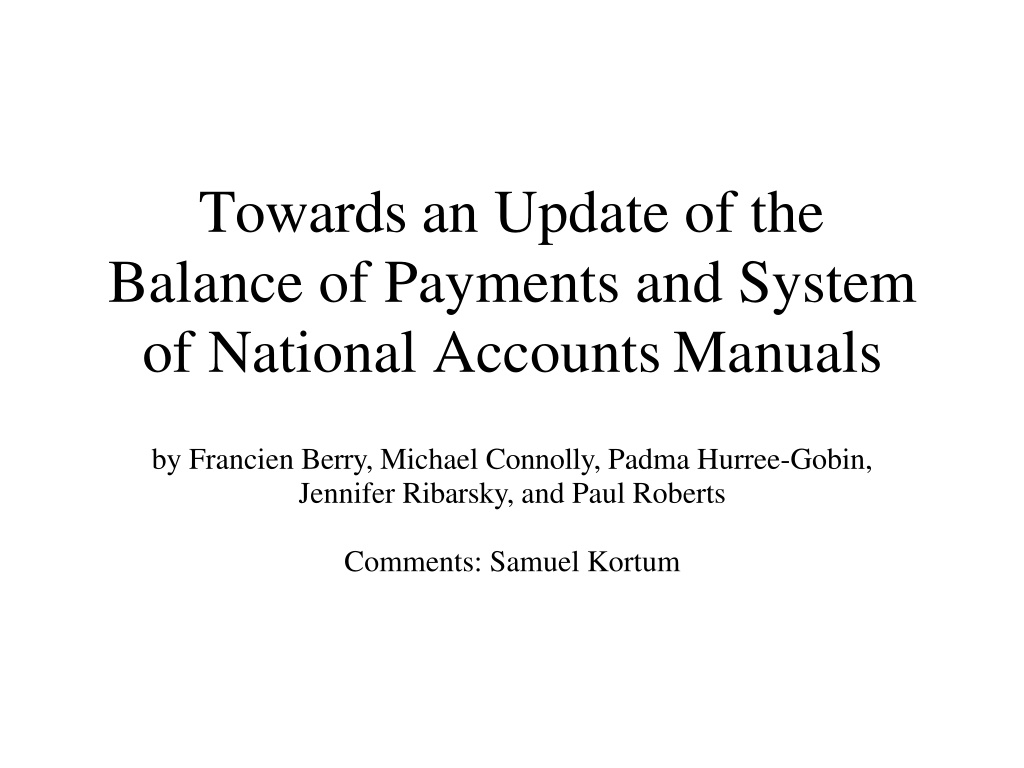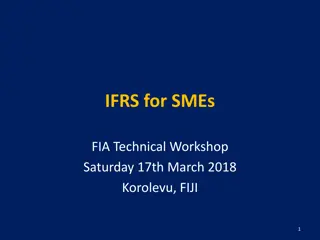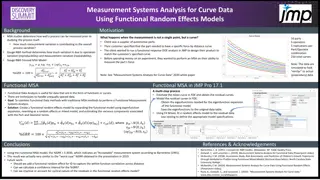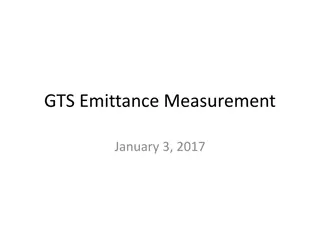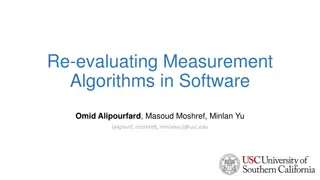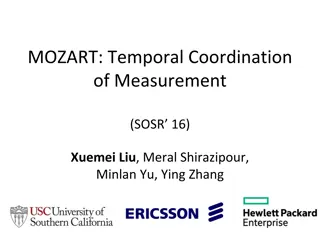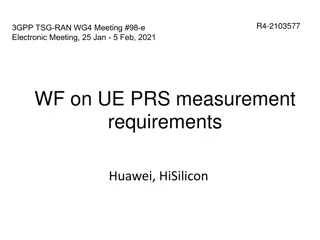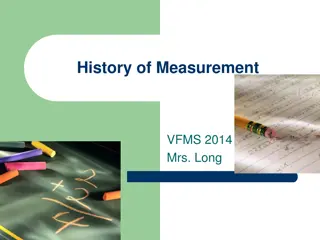Understanding the Impact of Intangibles in Global Economic Measurement
This paper discusses how globalization affects economic measurement, focusing on the challenges posed by intangibles such as patents, trade secrets, and intellectual property in national accounts. The handling of these assets is crucial for accurate economic analysis and reporting, especially in the context of multinational enterprises (MNEs).
Download Presentation

Please find below an Image/Link to download the presentation.
The content on the website is provided AS IS for your information and personal use only. It may not be sold, licensed, or shared on other websites without obtaining consent from the author. Download presentation by click this link. If you encounter any issues during the download, it is possible that the publisher has removed the file from their server.
E N D
Presentation Transcript
Towards an Update of the Balance of Payments and System of National Accounts Manuals by Francien Berry, Michael Connolly, Padma Hurree-Gobin, Jennifer Ribarsky, and Paul Roberts Comments: Samuel Kortum
Overview How does globalization affect our measurement of the economy?
Overview How does globalization affect our measurement of the economy? This paper takes a broad look at that question tractable issues: remember GNI not just GDP less tractable issues: complications from MNE s and SPE s
Overview How does globalization affect our measurement of the economy? This paper takes a broad look at that question tractable issues: remember GNI not just GDP less tractable issues: complications from MNE s and SPE s My discussion will focus on intangibles a common thread through the less tractable issues
Intangibles Intangibles show up in the accounts as: assets: patents, trade secrets investments: intellectual property products returns: royalties
Intangibles Intangibles show up in the accounts as: assets: patents, trade secrets investments: intellectual property products returns: royalties Intangibles create challenging measurement issues they ll come back to bite us if we don t treat them right!
Intangibles Intangibles show up in the accounts as: assets: patents, trade secrets investments: intellectual property products returns: royalties Intangibles create challenging measurement issues they ll come back to bite us if we don t treat them right! Intangibles are central to MNE s, but also have a life of their own
Hill (1999) They are the originals created by authors, , engineers, , film studios These originals are intangibles that have no physical dimensions or spatial co-ordinates of their own They can be transmitted electronically (pg 427) lack of a spatial coordinate means they may be footloose not easy to assign to a particular country
Hill (1999) They are the originals created by authors, , engineers, , film studios These originals are intangibles that have no physical dimensions or spatial co-ordinates of their own They can be transmitted electronically (pg 427) lack of a spatial coordinate means they may be footloose not easy to assign to a particular country Hill insists that we distinguish intangibles from services yet the two get lumped together in services trade intangibles do provide a service, perhaps long after creation
Hill (1999) They are the originals created by authors, , engineers, , film studios These originals are intangibles that have no physical dimensions or spatial co-ordinates of their own They can be transmitted electronically (pg 427) lack of a spatial coordinate means they may be footloose not easy to assign to a particular country Hill insists that we distinguish intangibles from services yet the two get lumped together in services trade intangibles do provide a service, perhaps long after creation Hill advocates a three-part scheme: goods, services, intangibles
Romer (1990) How to bring technology (key to growth) into economic analysis could just as well have been about intangibles
Romer (1990) How to bring technology (key to growth) into economic analysis could just as well have been about intangibles Technology is a non-rival good (can use it everywhere at the same time)
Romer (1990) How to bring technology (key to growth) into economic analysis could just as well have been about intangibles Technology is a non-rival good (can use it everywhere at the same time) Rival factors generate constant returns technology generates increasing returns
Romer (1990) How to bring technology (key to growth) into economic analysis could just as well have been about intangibles Technology is a non-rival good (can use it everywhere at the same time) Rival factors generate constant returns technology generates increasing returns Value of technology (incentive to invest) via excludability institutions like patent protection imperfect competition and mark-up pricing
Implications Implication for economic theory: to treat technology right, change modeling fundamentals constant returns in rival factors only imperfect competition to support innovation in the past 30 years we ve made substantial progress
Implications Implication for economic theory: to treat technology right, change modeling fundamentals constant returns in rival factors only imperfect competition to support innovation in the past 30 years we ve made substantial progress Implications for economic measurement: to treat intangibles right, change measurement fundamentals
Recap SNA 2008 contains a clear discussion ofintangibles But, ducks the profound implications of non-rivalry I could find no reference to non-rivalry in SNA2008 What s gained by a more fundamental rethinking of intangibles?
Suggestions Treat intangibles as non-rival technology a source of TFP growth, not a factor ofproduction
Suggestions Treat intangibles as non-rival technology a source of TFP growth, not a factor ofproduction Consider imperfect competition helps to integrate MNE data into national accounts justifies price exceeding marginal cost, and profit
Suggestions Treat intangibles as non-rival technology a source of TFP growth, not a factor ofproduction Consider imperfect competition helps to integrate MNE data into national accounts justifies price exceeding marginal cost, and profit Tie together investments in intangibles with returns to intangibles resolves who counts the returns as a services export
Conclusions Its easy to find fault in any measurement system Its not easy to to do better if you re honest about the data constraint (Zvi Griliches) My comments may sound naive in this sense I hope they lead to a good discussion
